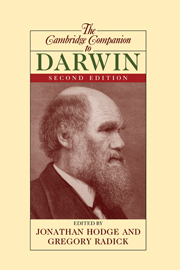Book contents
- Frontmatter
- Introduction
- Part I Darwin’s theorising
- Part II Historical contexts
- 6 Is the theory of natural selection independent of its history?
- 7 Darwin’s science and Victorian philosophy of science
- 8 Darwin and Victorian Christianity
- 9 Darwin, social Darwinism and eugenics
- 10 The place of Darwin’s theories in the intellectual long run
- Part III Current issues
- Part IV Philosphical prospects
- Guide to further reading
- List of references
- Index
8 - Darwin and Victorian Christianity
from Part II - Historical contexts
Published online by Cambridge University Press: 28 May 2009
- Frontmatter
- Introduction
- Part I Darwin’s theorising
- Part II Historical contexts
- 6 Is the theory of natural selection independent of its history?
- 7 Darwin’s science and Victorian philosophy of science
- 8 Darwin and Victorian Christianity
- 9 Darwin, social Darwinism and eugenics
- 10 The place of Darwin’s theories in the intellectual long run
- Part III Current issues
- Part IV Philosphical prospects
- Guide to further reading
- List of references
- Index
Summary
During his Cambridge years, Darwin was preparing to become a priest in the Anglican Church. Later in life he saw the irony: 'Considering how fiercely I have been attacked by the orthodox it seems ludicrous that I once intended to be a clergyman.' Why he was attacked by the orthodox has never been difficult to explain. Offering a naturalistic account of the emergence of human beings from ape-like ancestors, Darwin offended religious sensibilities as well as common sentiment. His theory of evolution by natural selection reinforced doubts about biblical authority at a particularly sensitive time. It could easily be interpreted as an affront to human dignity and it called for a serious re-thinking - not necessarily a rejection - of traditional Christian doctrines. Despite friction between competing Christian traditions, and despite political tensions in England between the established Anglican Church and socially disadvantaged dissenters, there were features of a Christian creed that transcended party lines. These were belief in an all-powerful, merciful God on whom the world depended for its creation and continued existence. Humankind had been made in God's image and had been granted the privilege of free will. The privilege extended to dominion over, and responsibility for, the rest of creation. The Christian God was an active, living God, to whom prayers were directed and whose providence was not confined to an original creative act.
- Type
- Chapter
- Information
- The Cambridge Companion to Darwin , pp. 197 - 218Publisher: Cambridge University PressPrint publication year: 2009
- 6
- Cited by



